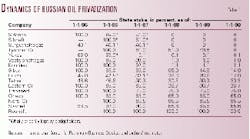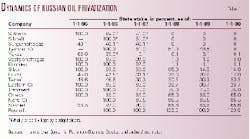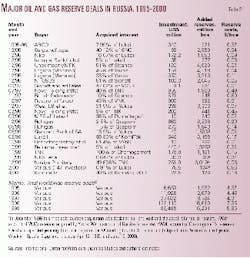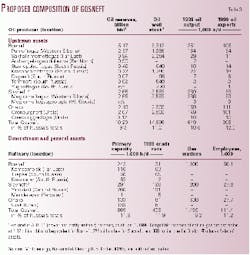Russia's oil privatization is more greed than fear
Lukoil would like to take over Rosneft's international projects off Sakhalin Island and seeks after the oil-rich Arkhangelskgeoldobycha -Rosneft's geological subsidiary in the far-north Timan Pechora province.
After 7 years of dramatic decentralization and dynamic privatization of Russia's oil industry, the pendulum of oil control has started to move back. However, despite the obvious need for a better-regulated industry and rising state-centric tendencies, liberalization of Russia's oil market seems to have passed the point of no return.
Unprecedented clearance sale
The radical reorganization of Russia's oil sector launched in late 1992 and the hasty sale of state oil property that dates to autumn 1995 have markedly changed industry ownership/management patterns.
The core sector of the national economy has undergone its radical transformation from a wholly state-run oil distribution system toward a mostly privatized quasi-market "petropreneur-ship."
Despite some holdbacks in selling state oil property and a grave impasse caused by the August 1998 financial crisis, privatization of the country's main budget-feeding sector has advanced with unprecedented speed and scope. Within a few years (mainly in 1996-97) the bulk of the assets were substantially privatized, with all leading oil entities having freed themselves from state surveillance (Table 1).
This did not help much in patching the deplorable federal budget. Thanks to the controversial "shares-for-loans" scheme, under which in 1995-96 the government collateralized (and finally surrendered) its controlling stakes in the leading oil producers (in Yukos, Surgutneftegaz, Sidanco, Sibneft, and partly in Lukoil) against commercial bank loans, the state received a paltry $500 million. However, the state actually handed strategic industry control to a few financial tycoons (now known as Russian "oligarchs").
What is even more astonishing is that this hasty and all-out sell-off has happened to the world's largest oil-producing industry, which has been a bulwark of the centrally-planned economy for decades.
More under the hammer
Still, this year may see more juicy chunks of state oil property on the block. In particular, by November 2000, the Ministry of State Property (Mingo- simuschestvo) plans to start selling 4% to 7.5% of Lukoil shares through American Depository Receipts (ADRs) on the New York and London stock exchanges, with a minimum of $400 million targeted as federal budget receipts.
Also, long-delayed sales of state stakes in Rosneft (25% plus one share), Russia-Belarus Slavneft (19.68%), and Onako (all the state's remaining 85%) can also materialize before yearend 2000. Mingo- simuschestvo declared such privatization plans in May. The planned cash auctions of these assets are expected to add to the federal budget 14-17 billion rubles ($400-500 million). With the previous failures to sell Rosneft and Slavneft, the expectations may prove to be exaggerated.
Admittedly, if reasonably priced, the earmarked state oil assets will find interested buyers. It is an open secret that Russia's largest company Lukoil would like to take over Rosneft's international projects off Sakhalin Island and seeks after the oil-rich Arkhangelsk-geoldobycha (AGD)-Rosneft's geological subsidiary in the far-north Timan Pechora province. AGD holds around 30 licenses for nearly 1 billion bbl of explored reserves, with 58% of these assets already controlled by Lukoil. Meanwhile Sibneft, a hawkish oil major operating in Western Siberia, is known to dream about Rosneft's main producing unit Purneftegaz. Abramovich/Berezovsky-controlled Sibneft is widely believed to hold at least 10% in this 160,000-b/d Tyumen-based oil producer. Aggressive major Tyumen Oil (TNK) also claims unspecified areas of Rosneft's business.
In turn, Slavneft's favorably-located refineries (primarily the 320,000-b/d Mozyr plant in Belarus) are of great appeal to Lukoil and TNK. The latter recently acquired 12.6% of the Russia-Belarus oil company, 27.5% of its 240,000-b/d Megionneftegaz oil-producing subsidiary in West Siberia, and 33.1% of the 280,000-b/d Yaroslavl refinery in Central Russia. To protect itself from hostile takeover Slavneft acquired 5-10% stakes in most of TNK's West Siberian oil-producing affiliates and cornering more TNK shares from Nizhnevartovsk oil workers.
As for Urals-based Onako, its Orsk refinery must be of interest to Lukoil and its oil-producing capacities have always attracted Khodorkovsky-controlled Yukos, which recently bought 16.1% of voting rights (and no less than 31% of total shares) in Onako 's main oil producer Orenburgneft. In mid-May, Yukos chairman Mikhail Khodorkovsky claimed that his company would like to increase its 3% stake in Onako by paying $200-400 million for the 85% remaining state shares in the Orenburg-based holding at a cash auction tentatively set for August.
Unlikely competition
However, even if the planned auctions are a success, the expected budget receipts should not strike imagination.
First, any real price-boosting competition in Russian oil privatization sales should be ruled out-it never happened before. The potential competitors are likely to reach traditional back-room deals, and a winner's price will hardly differ from an auction floor price. Symptomatically, in early June top managers of Lukoil and Yukos revealed their coordinated plans to bid jointly for Onako 's 85% stake.
Secondly, the rather high investment risks associated with doing business in today's Russia will surely hold acquisition prices greatly below typical world levels.
Early this year the Russian Federal Property Fund (RFFI) completed preliminary work for a commercial tender for the blocking (25%) stake in Rosneft. Starting price was preliminarily fixed at $305 million, including $161 million of investment obligations. If finally sold at this price, a quarter of Rosneft's recoverable reserves (estimated as a whole at over 11 billion bbl of oil equivalent) would go for less than 11cents/boe. The other state oil assets earmarked for cash auctions (i.e., Slavneft and Onako) look even worse.
If one relates the maximum expected value of auction proceeds (around $500 million) with estimated oil and gas reserves going on the block with the designated shares in Rosneft, Slavneft, and Onako (altogether about 5.5 billion boe), average unit cost would not exceed 9cents/boe. This is not a great deal compared with $4-7/boe typically recorded in major world oil and gas reserves acquisitions or other Russian oil property deals (Table 2).
Furthermore, sales of Rosneft, Slavneft, and Onako can be postponed (or banned) because the assets may be needed to form a state oil company.
State-run oil major
The very idea of creating the major state-run oil monopoly dates to 1994, when the Russian Ministry for Fuel and Energy (Mintopenergo) suggested converting then-State Enterprise Rosneft into Russian National Oil Co. (RNNK). Such a concern should have enjoyed many advantages over private and smaller state entities.
Understandably, the intended canonization of Rosneft as the privileged "first among equals" came into clashes with the neglected interests of the other Russian oil majors and was quickly buried under a thick layer of "grounded criticism."
Still, the undying idea was given a strong boost in late 1998 and took a form of suggested uniting state stakes in the difficult-to-sell, state-controlled oil companies-Rosneft, Slavneft, and Onako -for the creation of a state oil company, dubbed Gosneft, which is Russian for "State Oil" (Table 3). Likewise, due to fierce opposition of both private and state-run companies (including Onako and Slavneft), the state-backed oil merger was suspended.
However, the idea of a state oil company backed vigorously by former energy minister Viktor Kalyuzhny turned out to be less repulsive-after all, it suggested to form something rather "equal among equals"-and was much better timed. It could not be indefinitely shelved but had to be practically addressed under the new economic and political conditions.
First, by end-1999, the Russian oil stock market has recovered to its pre-crisis levels, and the remaining state oil property could be now sold at reasonable prices.
Second, Russia's federal authorities inspirited by the new (to-be-certainly-elected) President Vladimir Putin demonstrated their obvious bias toward tougher state governance of the national economy and its oil sector. Hence, in early 2000 Mingosimuschestvo and RFFI urged the long-delayed privatization of Rosneft, Slavneft, and Onako for the understandable fiscal (budget-filling) reasons, while Mintopenergo officials started to fiercely advocate combining these (and some other) state oil assets into Gosneft on grounds of state security (and their own personal protection). "The country needs an instrument to regulate prices of gasoline and other oil products in order to guarantee fuel supplies to northern regions, the army and the agricultural sector. Gosneft must become this instrument,"1 said Kalyuzhny.
On the contrary, the new energy minister, Alexander Gavrin, who had long affiliation with Lukoil (and is assumed promoted to his new position by the firm), will hardly advocate the idea of combining the three state-controlled companies into Gosneft. Gavrin will rather let the remaining assets be broken up with juicy chunks going to his former employer.
Budget or national security?
Anyway, while the all-out sell-off of state oil property would mean further decline in federal control of the national oil industry, formation of a state oil company would face serious financial problems.
In addition to the loss of expected privatization money, creation of Gosneft would require an expensive buyback of minority interests in the combined companies' subsidiaries which are not sufficiently controlled by their holdings. Although Russian oil holdings ordinarily have 38% of all shares (and 50.7% of voting rights) in their subsidiaries, in some cases Rosneft's stake is limited to only 25.5% (Arkhangelskgeoldobycha), 9.3% (Stavropolneftegaz), and even 8.5% (Stavropolnefteprodukt). Onako 's stake in "its own" Orenburggeologia does not exceed 10%.
To secure effective control of its subsidiaries, the state-run oil companies which were designated to form Gosneft would have to raise their stakes up to at least 75% of voting shares in each controlled enterprise. According to available (and rather varying) estimates, the state would have to spend $130-450 million for the lacking interests in the insufficiently-controlled units of Rosneft, Slavneft, and Onako (not to mention the hundreds of millions of dollars of the missed privatization proceeds).
No doubt the persistently dire state of Russia's federal budget does not favor Gosneft's creation, while the intended sale of remaining state oil property won't facilitate desirable restoration of the weakened state governance of the strategically-important national business. In fact, further tactics of Russian oil privatization encapsulate a confusing dilemma-of temporarily losing the budget's receipts or finally losing state control over the industry that generates a hefty quarter of Russia's export revenues and tax collections.
It is difficult to predict the final outcome, but the greed of budget money increasingly seems to be more than the fear of the nation's energy insecurity.
Reference
- Nefte Compass, Jan. 20, 2000, p. 4.
The authors
Eugene Khartukov is general director of International Center for Petroleum Business Studies (ICPBS), Moscow; head of World Energy Analysis & Forecasting Group (GAPMER), Moscow; and vice-president (Eurasia) of Petro-Logistics, Geneva. E-mail: [email protected]
Ellen Starostina is finance director of Lerges Ltd., Moscow, and an international consultant on oil finance and taxation to trading companies and commercial banks.




